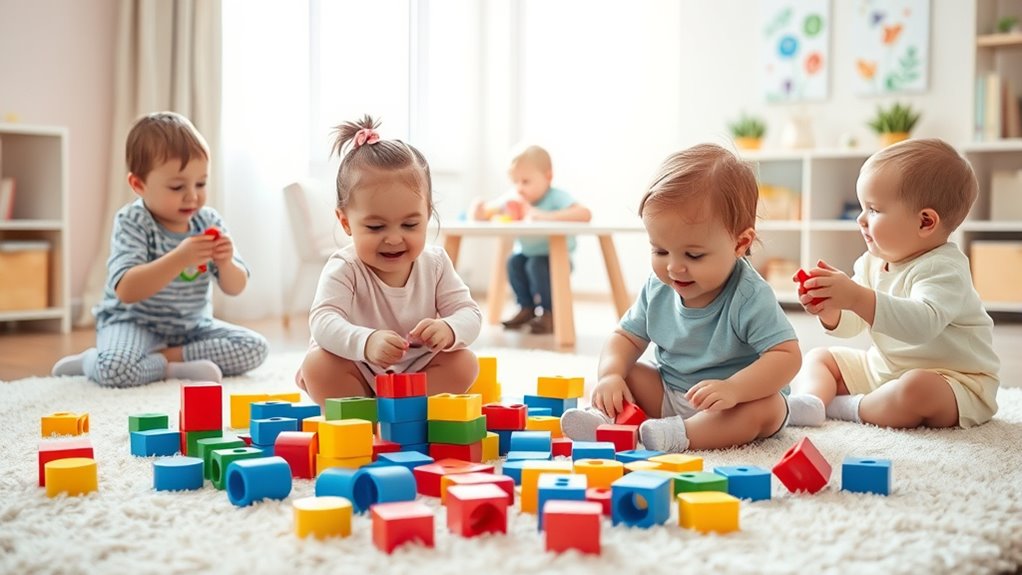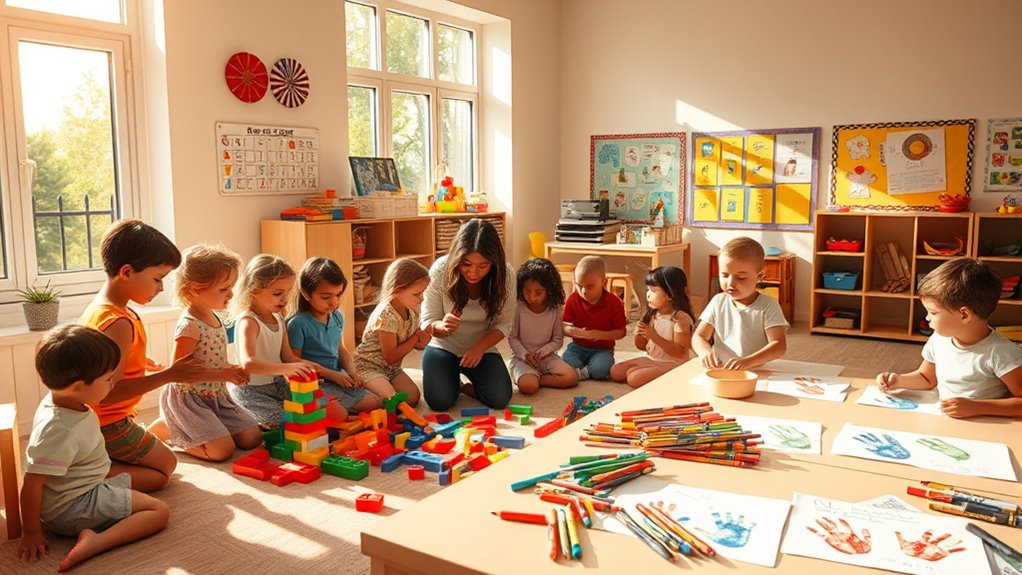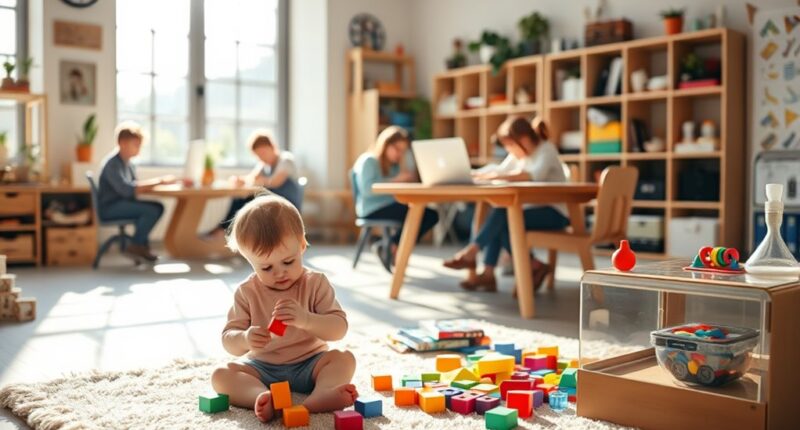For infants, use colorful mobiles and mirror games to boost visual and self-awareness. As toddlers, engage in sensory play and fine motor activities to enhance curiosity and coordination. Preschoolers benefit from daily read-aloud sessions and letter matching games, while school-age children thrive with poetry, math games, and team sports. Preteens can explore advanced arts and DIY projects to grow creativity. Each age group has unique activities that nurture learning, so stick around and discover more!
Key Takeaways
- Infants benefit from sensory-rich experiences like hanging mobiles and mirror games to enhance visual and self-awareness skills.
- Toddlers engage in sensory play and fine motor activities to boost vocabulary, curiosity, and coordination.
- Preschoolers thrive through storytelling, reading aloud, and letter recognition games that foster language development and creativity.
- School-age children enhance their skills with creative writing, math games, and team sports, promoting problem-solving and social interaction.
- Preteens explore advanced arts, science projects, and competitive sports to develop critical thinking, creativity, and teamwork abilities.

Lynncare Adjustable Arch Bassinet Toys for Infant & Toddlers, Stroller Arch, Baby Crib Toys with Fascinating Hanging for Stimulating Baby’s Senses and Developing Motor Skills
Entertained Car Seat Toy: Keep your baby engaged and entertained during car rides with this stroller arch toy…
As an affiliate, we earn on qualifying purchases.
As an affiliate, we earn on qualifying purchases.
Educational Activities for Infants

When it comes to educational activities for infants, engaging their senses is key to fostering development. You can start with a hanging mobile to captivate their visual attention with colorful, moving objects.
Introduce smiling faces to enhance social interaction, helping them recognize emotions. Singing songs not only entertains but also boosts their auditory and language skills.
Mirror games encourage self-awareness as they interact with their reflections. Sensory bottles filled with various materials can stimulate their visual and tactile senses, inviting exploration.
Don’t forget tummy time, which strengthens their muscles and prepares them for movement.

hand2mind See My Feelings Mirror, Play Therapy Toys, Mindfulness for Kids, Emotional Regulation for Kids, Social Emotional Learning Activities, Calm Down Corner Supplies, Calming Corner (Set of 1)
EMOTIONS FOR TODDLERS: Help children learn to label and identify emotions with the See My Feelings Mirror! Make…
As an affiliate, we earn on qualifying purchases.
As an affiliate, we earn on qualifying purchases.
Educational Activities for Toddlers

Toddlers thrive on exploration and play, making educational activities an essential part of their development. Engage your little one with sensory play like water bins or noodles to boost their vocabulary and curiosity.
Fine motor skills improve through activities like moving buttons or playing with playdough. Don’t forget gross motor activities; a dance party or obstacle course can enhance their coordination.
Arts and crafts using recycled materials spark creativity and imagination. Reading stories and singing songs during playtime integrates early literacy skills, while matching and sorting games promote cognitive growth.
Incorporate fun science experiments like baking soda and vinegar to teach cause-and-effect principles. These activities support your toddler’s overall growth while having fun together!

Melissa & Doug Wooden Alphabet Stamp Set – 56 Stamps with Lower-Case and Capital Letters Preschool Writing Toys, ABC Stamps, Kids Arts & Crafts, Letter for Kids Ages 4+
56 high-quality rubber stamps with contoured wooden handles
As an affiliate, we earn on qualifying purchases.
As an affiliate, we earn on qualifying purchases.
Educational Activities for Preschoolers

As children grow from toddlers into preschoolers, their learning experiences expand markedly. Reading aloud daily helps boost their language skills and sets the stage for future reading.
You can create a letter parking lot to help them match uppercase and lowercase letters, or encourage storytelling by making simple books together. Fun games like “Kick the Cup” combine gross motor skills with literacy, allowing them to knock over cups with letters.
Using alphabet stencils or stamps aids in recognizing and spelling their names. For social-emotional learning, activities like friend bingo or tossing a get-to-know-you ball foster interaction.
Engage them in creative arts and science explorations to round out their educational journey, ensuring a well-rounded preschool experience.

UNGLINGA 150 Experiments Science Kits for Kids, S.T.E.M Educational Project Toys for Boys Girls Birthday Gifts Ideas, Volcano, Chemistry Lab Tools Scientist Set
150 EXCITING EXPERIMENTS FOR KIDS: DIY projects to get kids' minds humming, try one of these science experiments,…
As an affiliate, we earn on qualifying purchases.
As an affiliate, we earn on qualifying purchases.
Educational Activities for School-Age Children

Educational activities for school-age children build on the foundations laid in preschool, fostering a deeper understanding of various subjects while encouraging creativity and critical thinking.
You can enhance language skills through poetry and creative writing, sparking imagination and expression. Phonic games like Scrabble can boost spelling and phonetic awareness. Engaging in mindfulness practices can also improve focus and concentration during learning activities.
Engage your child in math games and science experiments to develop problem-solving abilities and curiosity, which are crucial for cognitive development. Encourage creative expression through art, music, and drama, which not only enhance creativity but also social skills.
Engaging in math games and science experiments fosters problem-solving skills and curiosity, while creative outlets enhance both creativity and social abilities.
Team sports and board games promote teamwork and social interaction, while outdoor play improves physical fitness.
Finally, involve them in group projects to strengthen communication and leadership skills, preparing them for collaborative environments. Additionally, incorporating STEM education activities can significantly enhance critical thinking and problem-solving skills in children.
Educational Activities for Preteens

While preteens explore their identities and interests, engaging them in diverse educational activities can greatly enhance their development. Competitive sports teach teamwork and discipline, while advanced arts and crafts like painting boost creativity and fine motor skills.
Encourage them to immerse themselves in science projects that foster critical thinking and problem-solving. Reading chapter books expands their vocabulary and imagination, and introducing basic coding cultivates logical thinking.
Socially, joining interest-based clubs helps them make friends, and community service builds empathy and responsibility. Outdoor activities like nature exploration promote fitness, while cooking teaches essential life skills.
Finally, DIY projects and brain teasers enhance creativity and critical thinking, equipping preteens with valuable skills for their future endeavors. Incorporating educational toys into their playtime can further reinforce learning and support their overall development.
Educational Activities for Teenagers

Teenagers thrive on engagement, making it essential to introduce a variety of educational activities that cater to their interests and developmental needs.
Consider joining debating workshops to enhance public speaking and leadership skills. Role-playing exercises can help you navigate different social scenarios. Volunteering not only fosters empathy but also connects you to your community. Fun group games like treasure hunts promote teamwork and communication.
For after-school activities, sports or school clubs like debate and art encourage social interaction. Cooking or coding can build practical skills, while journaling enhances emotional expression.
Explore creative pursuits like photography or fashion design to spark your imagination. Outdoor adventures, such as hiking or geocaching, offer unique problem-solving experiences while connecting you with nature.
Benefits of Engaging in Age-Appropriate Activities

Engaging in activities tailored to specific age groups offers numerous benefits that support overall development. For cognitive growth, these activities help you process new information effectively and enhance problem-solving skills. When you play age-appropriate cognitive games, you improve your memory and concentration.
Physically, these activities refine both fine and gross motor skills, strengthen coordination, and promote teamwork through age-appropriate sports.
Socially and emotionally, engaging in group activities fosters empathy and communication, while role-playing enhances emotional intelligence.
Academically, age-specific activities boost your interest in subjects and lay a solid foundation for future success.
Finally, child-led tasks encourage confidence and independence, helping you develop resilience and a sense of achievement as you grow.
Frequently Asked Questions
How Can I Assess My Child’s Developmental Progress Through Activities?
You can assess your child’s developmental progress through various activities by observing them during play and everyday tasks.
Pay attention to their interactions, problem-solving skills, and communication. Keep anecdotal notes to track their achievements and challenges.
Engage them in diverse activities that encourage cognitive, physical, and social-emotional skills.
Regularly discuss your observations with family members to gain insights and adjust your strategies to support their growth and learning effectively.
What Are the Best Materials for Sensory Play at Home?
For sensory play at home, you’ve got plenty of great materials to choose from!
Dry options like rice, split peas, and craft sand are affordable and reusable.
Wet materials like water and gelatin provide exciting tactile experiences.
You can also use household items like flour for dough or cardboard rolls for creativity.
Don’t forget to incorporate nature items or recycled materials for added texture and stimulation.
Enjoy the exploration!
How Much Time Should Children Spend on Educational Activities Daily?
You should aim for your child to spend a balanced amount of time on educational activities each day.
For younger kids, a few hours of structured learning mixed with play is ideal.
School-aged children typically engage in around 6 to 7 hours in school, plus extra time for homework.
Don’t forget to include breaks and physical activity, as both are essential for maintaining focus and promoting overall development.
Balance is key!
Are There Any Online Resources for Age-Appropriate Educational Activities?
Absolutely, there are plenty of online resources that offer age-appropriate educational activities.
For younger kids, you might explore PBS KIDS or ABCmouse for interactive games and lessons.
If you’re looking for resources for older children, BrainPop and National Geographic Kids provide engaging content across various subjects.
For teens, Khan Academy and Crash Course offer in-depth video tutorials.
You’ll find something suitable for every age group to keep learning fun and effective!
How Can I Encourage My Child to Engage in Learning Independently?
To encourage your child to engage in learning independently, create a consistent daily routine that includes designated learning times.
Incorporate hands-on activities that spark curiosity and allow for exploration.
Give choices in learning tasks to foster self-direction.
Encourage self-reflection by discussing their progress and setting achievable goals together.
Celebrate their efforts with positive reinforcement, and model curiosity yourself to inspire a love for learning.
This supportive environment will boost their independence and motivation.
Conclusion
Incorporating age-appropriate educational activities into your child’s routine can spark their curiosity and foster essential skills. Whether you’re stacking blocks with an infant or tackling a science project with a teenager, each activity lays the groundwork for lifelong learning. So, grab your time machine and jump into these fun experiences together! The benefits of engaging in these activities are endless, helping your kids thrive and making memories that’ll last a lifetime.









